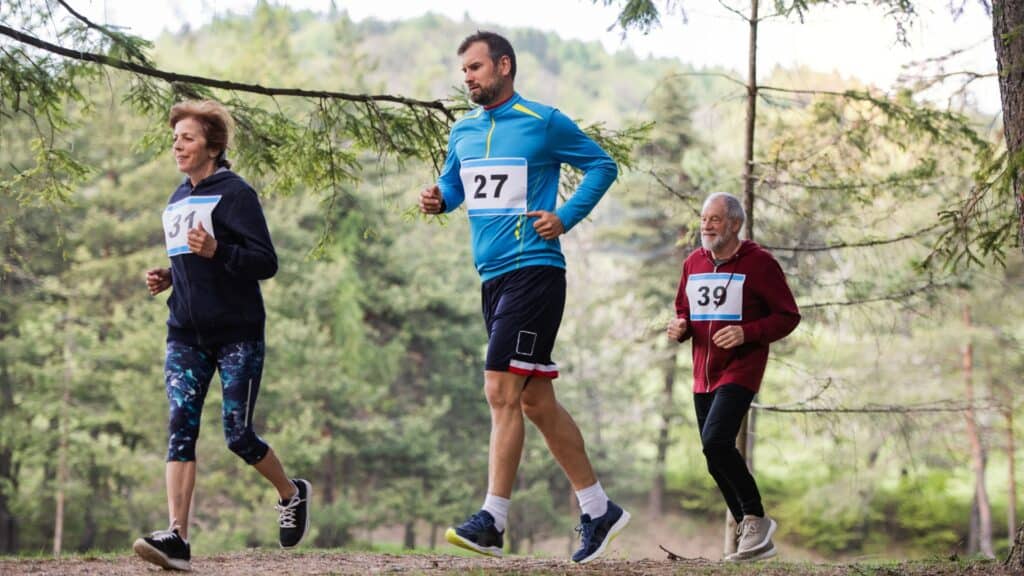As we age, physical abilities naturally change. For runners over fifty, maintaining a healthy diet is crucial to keeping energy levels high and preventing injuries.
Proper nutrition can be a game-changer to improve endurance and reduce the risk of chronic diseases. But what’s the best approach to eating for runners over 50?
As a general rule, your diet should consist of a healthy mix of carbohydrates, proteins, and fats.
In this guide, we will be diving into the most critical areas of nutrition that runners need to pay attention to when they hit their fifties. From carbs to protein, vitamins, and hydration, let’s get started.

Why It’s Crucial to Take Care of Your Diet as You Age
Aging is a natural process that every human being goes through. While aging brings wisdom, experience, and maturity, it also brings some challenges and changes in physical and mental health.
As we grow older, our bodies undergo several transformations that make us more prone to various diseases and health problems. Taking care of our diet is more important than ever in our old age.
Here are some reasons why it matters more than you think:
- Nutritional Needs Change with Age
As we age, our body’s nutritional needs change drastically. Our metabolism slows down, and our body needs fewer calories than before.
At the same time, we need more of some nutrients, such as calcium and vitamin D, to maintain strong bones and prevent osteoporosis. Our bodies also need more antioxidants to slow down the aging process and reduce the risk of chronic diseases such as cancer and heart disease.
Therefore, it’s essential to consume nutrient-rich foods while avoiding foods that can cause harm, such as processed and high-fat foods.
- Digestive System Becomes Less Efficient
The process by which our bodies absorb nutrients from food is hampered by the aging of our digestive systems. This means that we need to eat more nutrient-rich foods to obtain the same amount of nutrients as we did before.
To avoid digestive problems such as constipation and bloating, we should also drink plenty of water and consume fiber-rich foods such as fruits, vegetables, and whole grains.
- Hormonal Changes Affect Appetite
Hormonal changes that occur as we age can make us feel less hungry. We may also experience a reduced sense of taste and smell, making us less interested in food. However, it’s crucial to maintain a healthy appetite and consume enough calories to meet our body’s energy needs.
To make food more appealing, we can experiment with different flavors, spices, and textures. Eating with friends and family can also make mealtime more enjoyable, and we may be more likely to eat enough food.
- Diet Affects Brain Health
As time passes, our brain function can decline, leading to increased vulnerability to memory loss and cognitive issues. There is a growing awareness that our diet significantly influences brain health. Certain foods, such as fatty fish, nuts, and berries, have been shown to improve brain function and reduce cognitive decline.
At the same time, foods high in saturated and trans fats can increase the risk of cognitive problems. Therefore, eating a brain-healthy diet is crucial to maintaining cognitive function as we age.
- Increased Risk of Chronic Diseases
Over time, our bodies become more prone to chronic diseases like diabetes, hypertension, arthritis, and cancer. The good news is that the risk of developing many of these illnesses can be reduced through lifestyle changes such as adopting a healthy diet and incorporating regular exercise.
By maintaining a healthy diet rich in nutrients, not only can we reduce our risk of developing these diseases, we can enhance our longevity.
- Diet Affects Overall Health
It’s essential to recognize that your diet affects your overall health. Eating a healthy diet can reduce the risk of chronic diseases, such as heart disease, diabetes, and cancer, which are common in old age.
On the other hand, a poor diet can increase the risk of these diseases and exacerbate existing health problems. A healthy diet is also crucial for maintaining a healthy weight, reducing inflammation, and improving immune function.

Key Nutrients to Focus on as You Age
As you reach the age of 50, it becomes increasingly important to take care of your body and ensure that you are receiving the necessary nutrients to maintain optimal health.
To help you with this, we suggest paying close attention to the following seven essential macronutrients and micronutrients that your body requires:
- Carbohydrates
Carbohydrates are the macronutrients that provide the body with its primary source of energy, especially during high-intensity exercise. While they play a crucial role in fueling the body for activities like short jogs or long-distance runs, it’s important to note that during low to moderate-intensity exercise, carbohydrates also serve as a primer to facilitate the burning of fat for energy.
As a runner over fifty, it’s essential to consume carbohydrates that can provide a longer and more sustainable energy boost compared to simple carbohydrates, such as sugars and refined grains.
Complex carbs such as whole grains, vegetables, and fruits are excellent choices as they provide slow-releasing energy, keeping your blood sugar levels steady throughout the run.
Moreover, these types of carbohydrates are rich in fiber, vitamins, and minerals, which can help prevent chronic diseases such as cancer, heart disease, and diabetes.
- Protein
Protein helps build and repair muscle tissue, aiding in the recovery process and reducing the risk of injury and fatigue during runs.
Excellent sources of protein for runners over fifty include lean meats like beef, poultry, and fish, as well as eggs, milk, cheese, beans, legumes, Greek yogurt, and soy.
- Potassium
Potassium is a crucial electrolyte that your cells require to perform essential activities such as regulating muscle contractions and maintaining a healthy heart rate. Insufficient intake of potassium can lead to various health problems, such as high blood pressure, heart disease, and diabetes. It is essential to keep these health concerns in mind at any age, especially as you grow older.
Some healthy food options include apricots, lentils, prunes, raisins, acorn squash, potatoes, bananas, soybeans, and kidney beans.
- Omega-3 Fatty Acids
The consumption of omega-3s can reduce inflammation and heart disease, while also increasing HDL cholesterol and triglyceride levels. As you age, your brain function decreases naturally, but omega-3s can boost cognition.
Foods rich in omega-3 fatty acids include flaxseed oil, chia seeds, walnuts, salmon, and herring.
- Vitamins B12
It is essential to consume this vitamin for the proper formation of red blood cells, neurological function, and DNA synthesis. Stomach acidity decreases with age, and about 10 to 30 percent of adults over 50 have trouble absorbing this vitamin because of stomach acidity issues.
- Calcium and Vitamin D
Vitamin D is a crucial nutrient that plays a vital role in the body’s ability to absorb calcium. Calcium is essential for maintaining strong bones, improving immune function, and reducing inflammation. Without adequate levels of vitamin D, the body’s ability to absorb calcium is compromised, which can lead to a wide range of health issues. Therefore, it is important to ensure that you are getting enough vitamin D to support your overall health and well-being.
Foods rich in vitamin D include fatty fish, fortified milk and cereal, eggs, mushrooms, and cod liver oil. Foods rich in calcium include seeds, cheese, yogurt, sardines, salmon, milk, and almonds.
- Water
Staying hydrated is crucial for runners. Water helps to regulate the body’s temperature, transports nutrients, and eliminates waste products from the body.
If you are over 50 and a runner, you should aim to drink at least 8 glasses of water per day and rehydrate after running. It’s best to avoid sugary or fizzy drinks, as they can disturb the body’s fluid balance.
- Supplements
For runners over fifty, certain supplements can help provide essential vitamins and minerals that they may not be getting enough of from their regular diet.
Some of the commonly recommended supplements for runners include multivitamins, fish oil, glucosamine, and calcium tablets, among others.
However, it’s important to consult a doctor or a dietician before taking any supplements, as taking them in the wrong doses or combinations can lead to potential side effects.
- Fiber
Fiber is an essential nutrient that plays a crucial role in maintaining a healthy gastrointestinal (GI) system. It helps regulate bowel movements, prevent constipation, and maintain regularity in your digestive system.
Additionally, fiber has been shown to lower cholesterol levels, which is a major risk factor for heart disease.
Healthy food choices include whole grains, fruits, vegetables, beans, and legumes.
- Iron
Iron is an essential mineral that enables the transportation of oxygen by red blood cells to your muscles, providing them with the energy they need.
Additionally, iron plays a crucial role in the metabolism of carbohydrates, which serve as the primary source of fuel for your muscles during exercise. Without adequate iron levels, your muscles may not receive enough oxygen to function properly, leading to fatigue and decreased performance.
- Fat
Fat is critical not only for exercise but also for immune function through fat-soluble vitamins. Healthy fat sources like avocados, nuts, seeds, and olive oil contribute to overall well-being.
These fats aid in the absorption of fat-soluble vitamins A, D, E, and K, supporting immune health and various physiological functions.
Here are some foods that are rich in iron: fortified cereal, oysters, lentils, spinach, and beef.
How Do I Know If I am Consuming Enough Nutrients?
If your body doesn’t receive enough essential nutrients, it can lead to various health issues. Some of the common symptoms of nutrient deficiency include extreme fatigue, headaches, and dizziness.
For instance, if you don’t get enough calcium in your diet, you might notice that your nails become brittle or you experience frequent bone-related injuries. Similarly, if you lack fiber in your diet, it can cause constipation and other gastrointestinal problems.
Therefore, it’s important to pay attention to these telltale signs and consult a healthcare professional to ensure that you’re getting all the nutrients your body needs to function properly.
If you observe that your body is taking longer or not recovering as effectively as it typically does after exercising, it could indicate that you are not consuming sufficient amounts of the appropriate nutrients.
In case you notice any of these symptoms, it is advisable to schedule an appointment with your doctor. It’s worth noting that although these symptoms could indicate a nutrient deficiency, they could also be indicative of other general health problems. Therefore, a doctor’s consultation is recommended to determine the underlying cause of the symptoms.
It is advisable to schedule an annual check-up, even if you are not experiencing any of the aforementioned symptoms, to proactively address any potential health issues.
Please keep in mind that a simple multivitamin may not necessarily be the solution to addressing nutrient deficiencies. Blood work is required to accurately identify any nutrient deficiencies.

Although taking a multivitamin may not cause any harm, it is always advisable to consult a doctor beforehand to ensure safety and accuracy. Furthermore, focusing on consuming nutrient-dense whole foods of high-quality can potentially eliminate the need for multivitamins.
Pro Tip: Scale Back on Sugar
According to the most recent dietary guidelines, it is recommended that individuals consume less than 10 percent of their daily caloric intake from added sugars, which are not naturally present in foods such as fruits or grains.
Although studies have shown that people of all ages tend to consume excessive amounts of added sugars, it appears that menopausal women may benefit the most from reducing their intake of such sugars due to the way their metabolisms function.
It is worth noting that while fruits contain natural sugars along with various essential nutrients, older athletes are often advised to consume no more than one or two servings of fruit per day. Furthermore, it is recommended that they consume these servings in the morning or before/after a workout for maximum benefit.
Eating the right foods and staying hydrated can help runners over fifty maintain their running goals and stay healthy. Choosing a well-balanced diet of complex carbohydrates, lean proteins, fruits, vegetables, and adequate vitamin and mineral intake can eliminate chronic disease risks and keep you on track with running.
Proper hydration and supplementation when necessary are essential for a healthy running lifestyle.



Comments are closed.